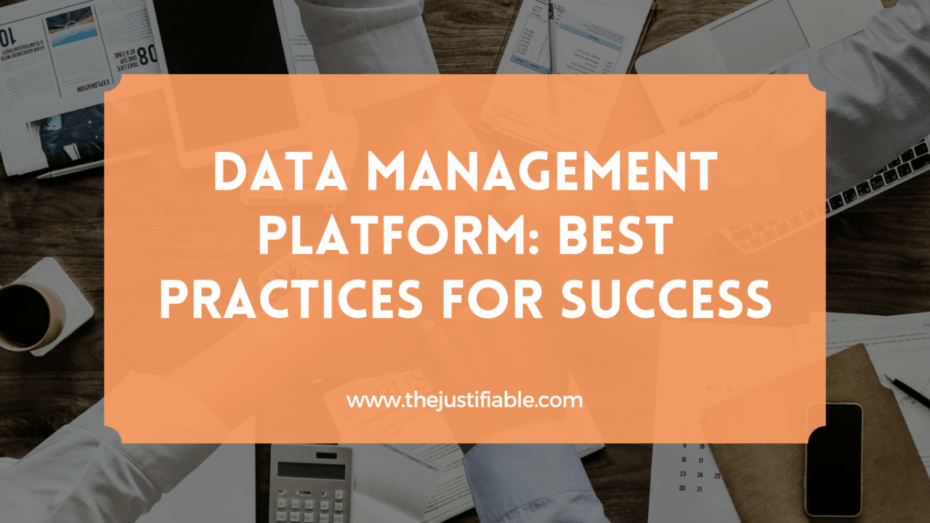Table of Contents
In an era where data is likened to oil, understanding how to manage this invaluable resource is critical. This is where a data management platform (DMP) comes into play.
It acts as the central hub that collects, organizes, and activates data from any source, enabling businesses to gain deeper insights into their customers. To fully appreciate the role and importance of a DMP, we must first define what it is and understand its function in the business environment.
Defining a Data Management Platform
A data management platform is a central software system that enables businesses to identify and manage vast volumes of data from various sources, both structured and unstructured.
These sources may include online channels like websites, mobile apps, and social media, as well as offline channels such as customer relationship management (CRM) systems and point of sale (POS) data.
The DMP uses advanced technology, such as Artificial Intelligence (AI) and machine learning, to process and analyze this data, then categorizes it into meaningful and actionable segments.
These segments, usually based on demographic, behavioral, or psychographic characteristics, help businesses understand their customers or audience on a deeper level. This granular view enables precision targeting, personalization, and enhanced decision-making.
Moreover, a DMP isn’t just about managing data. It’s about making sense of it. It transforms raw data into valuable information, empowering businesses to act with certainty and achieve better outcomes.
Role of Data Management Platforms in Business
In today’s digital age, a DMP has become an essential tool for businesses, irrespective of their size or industry. Its primary role is to gather data from all touchpoints, create a unified customer view, and facilitate data-driven decision making.
DMPs help businesses unlock the power of their data by streamlining the process of data collection, integration, and analysis. By breaking down data silos and consolidating data in one place, businesses can obtain a 360-degree view of their customers, better understand their preferences, and predict future behaviors.
Additionally, the insights derived from a data management platform allow marketers to design more effective campaigns, advertisers to make informed decisions, and sales teams to identify potential leads. It drives personalization, which has become a cornerstone of modern marketing strategies.
The role of a DMP also extends to compliance and data privacy. It helps businesses manage their data in line with global privacy regulations, such as the General Data Protection Regulation (GDPR) or the California Consumer Privacy Act (CCPA), thereby mitigating risks and maintaining customer trust.
Benefits of Using a Data Management Platform
In the era of big data, businesses need the right tools to manage, analyze, and leverage their vast data assets.
A data management platform (DMP) serves as a comprehensive solution, offering multiple benefits, such as improved data integration, enhanced customer insights, and efficient targeted advertising.
Each of these benefits plays a significant role in optimizing business operations and marketing efforts.
Improved Data Integration
One of the major advantages of using a data management platform is the ability it provides to unify and manage data from disparate sources. In the course of conducting business, data is collected from various touchpoints – website interactions, social media activity, CRM systems, customer surveys, and more. This data comes in different formats, making it a challenge to integrate and analyze cohesively.
A DMP simplifies this process by providing a centralized platform where all data can be collected, integrated, and standardized. It eliminates data silos, providing a unified view of data across multiple channels and platforms. The result is a single source of truth that allows for more accurate analysis and decision-making.
Through this improved data integration, businesses can understand the customer journey more holistically, identify patterns and trends more easily, and ultimately make more informed, data-driven decisions.
Enhanced Customer Insights
A data management platform goes beyond simple data collection and integration – it transforms raw data into meaningful insights. By categorizing and segmenting data based on various factors like behavior, interests, and demographics, a DMP provides a more detailed and nuanced understanding of the customer base.
These insights can reveal a wealth of information about customers – their preferences, their habits, their needs, and their buying behavior. This information can be invaluable in refining product offerings, improving customer service, personalizing marketing efforts, and generally enhancing the overall customer experience.
By providing a deep understanding of the customer, a DMP enables businesses to connect more effectively with their target audience, foster stronger customer relationships, and drive customer loyalty and retention.
Efficient Targeted Advertising
In today’s competitive marketplace, personalized, targeted advertising is key to capturing the attention of potential customers. A data management platform facilitates this by enabling businesses to create detailed customer segments based on a range of criteria – from basic demographic information to more specific behavioral data.
Using these segments, businesses can tailor their advertising messages to meet the needs and preferences of each specific group, resulting in more relevant and engaging ads. Furthermore, the insights provided by a DMP can help businesses identify new potential markets, optimize ad spend, and improve overall campaign performance.
By enabling efficient, precise targeted advertising, a data management platform can help businesses improve return on ad spend, increase conversion rates, and ultimately drive business growth.
Key Features to Look for in a Data Management Platform
Choosing a data management platform (DMP) is an important decision. The right platform can transform how you handle data, leading to improved decision-making, better customer understanding, and enhanced marketing efforts.
Key features to consider when choosing a DMP include data collection and integration capabilities, audience segmentation tools, and data security measures. Let’s delve into these crucial aspects.
Data Collection and Integration
A powerful feature of any DMP is its ability to collect and integrate data. The platform should be capable of ingesting data from a wide range of sources – online and offline – such as websites, social media platforms, CRM systems, email campaigns, and point-of-sale systems. The data comes in various formats and structures, and a good DMP should be able to handle this diversity seamlessly.
Furthermore, the platform needs to effectively integrate this data, breaking down silos and unifying the data into a single, cohesive view. The integration feature should provide a centralized repository for all data types and sources, turning fragmented data pieces into a coherent, easily understandable whole. This unified view helps to improve data consistency, ensure data quality, and boost the accuracy of data analytics and insights.
Audience Segmentation
Audience segmentation is another critical feature of a DMP. This feature allows businesses to divide their broader audience into smaller, more specific segments based on a range of characteristics – such as demographics, behavior, location, and preferences.
By doing so, businesses can tailor their messaging and campaigns to the specific needs and interests of each group, enhancing relevance and engagement.
The segmentation feature should be flexible and robust, allowing for the creation of detailed and complex segments that can capture the nuances of your customer base. Furthermore, it should enable real-time segmentation, allowing businesses to adapt quickly to changes in customer behavior and market conditions.
Data Security
Data security is a non-negotiable feature of any DMP. Given the sensitive nature of the data being handled – including personal customer information – it’s crucial that the platform has stringent security measures in place to protect against data breaches and unauthorized access.
The DMP should comply with all relevant data protection and privacy regulations, such as GDPR and CCPA. It should also provide features such as data encryption, access control, and regular security audits. Moreover, it should offer transparency in how data is collected, stored, and used, fostering trust with users and customers alike.
Best Practices for Implementing a Data Management Platform
Implementing a data management platform (DMP) is an essential step towards becoming a data-driven organization. However, to fully leverage the benefits of a DMP, you need more than just a powerful tool – you also need a clear strategy and well-defined processes. Here are some best practices to consider when implementing a DMP.
Clearly Define Your Business Objectives
The first step in implementing a DMP effectively is to clearly define your business objectives. What are you hoping to achieve with the platform? Whether it’s enhancing your customer segmentation, improving your targeted advertising, or gaining deeper customer insights, having clear objectives will guide your implementation process and help you choose the right platform for your needs.
These objectives should be closely aligned with your overall business goals and should be measurable, realistic, and time-bound. By setting clear objectives, you can ensure that your DMP implementation is focused, efficient, and designed to deliver tangible business outcomes.
Opt for a Scalable and Flexible Platform
When choosing a data management platform, it’s important to consider not just your current needs, but also your future requirements. Opt for a platform that is scalable and flexible, one that can grow with your business and adapt to changing market conditions.
Scalability ensures that your DMP can handle increasing volumes of data as your business grows, while flexibility allows it to integrate with new data sources and technologies. The platform should also allow for customization to suit your specific business needs and workflows.
Choosing a scalable and flexible DMP can future-proof your investment, ensuring that your platform remains effective and relevant even as your business and the data landscape evolve.
Prioritize Data Privacy and Compliance
In the age of data breaches and stringent privacy regulations, data privacy and compliance should be a top priority when implementing a DMP. Ensure that your platform has robust security measures in place and complies with all relevant data protection regulations, such as GDPR and CCPA.
This involves understanding where and how your data is stored, who has access to it, and how it is used. It also means ensuring that your data practices are transparent and that you have the necessary consent from your customers to collect and use their data.
Prioritizing data privacy and compliance not only protects your business from legal risks and potential fines but also builds trust with your customers, which can lead to better customer relationships and brand loyalty.
Maintaining Success with Your Data Management Platform
Investing in a data management platform (DMP) is just the beginning. To continually derive value from it and ensure its long-term success, regular maintenance and proactive strategies are required. These include conducting regular data quality audits, providing ongoing training and support to your team, and incorporating user feedback to improve data management.
Regular Data Quality Audits
The quality of data in your DMP directly influences the insights you derive, and consequently, the decisions you make. Therefore, conducting regular data quality audits is essential for maintaining the success of your data management platform.
These audits should assess the accuracy, completeness, and consistency of the data in your DMP. For instance, check for duplicates, inaccuracies, or missing values, which can compromise the integrity of your data. Regular audits can help identify and rectify these issues, ensuring your data remains reliable and trustworthy.
Moreover, it’s crucial to validate the sources of your data regularly. Are they still relevant and reliable? The data ecosystem is dynamic, and the sources that were once pertinent might no longer be the case.
Continuous Training and Support for Your Team
A data management platform is only as effective as the people who use it. Therefore, providing ongoing training and support to your team is crucial to the success of your DMP.
Training should not only cover the technical aspects of using the DMP but also the strategic implications. For example, how can the insights generated by the DMP be used to inform decision-making or enhance marketing campaigns?
Support should also be provided for problem-solving and troubleshooting. Your team should feel confident and competent in using the DMP, and they should have a clear understanding of who to contact when they encounter issues or have questions.
Incorporating User Feedback to Improve Data Management
User feedback is a valuable resource for improving your data management practices. Regularly seek feedback from the users of your DMP – this could be your employees, customers, or partners. What do they like about the platform? What challenges are they facing? What improvements would they like to see?
Incorporating this feedback into your data management strategy can lead to enhancements in the platform’s usability, functionality, and overall value. It can also help identify new opportunities or areas of focus that you might not have considered.
Case Studies of Successful Data Management Platform Implementation
Examining real-world examples can help elucidate the benefits and practical applications of a data management platform (DMP). In this section, we will explore two case studies from different industries – retail and healthcare – where the implementation of a DMP has led to significant improvements in business operations and outcomes.
Case Study 1: Successful Data Management in Retail
One of the most successful implementations of a data management platform has been seen in the retail sector. A multinational retail corporation, facing challenges with customer segmentation and personalization due to data silos, implemented a DMP to unify their data from various sources including online sales, in-store purchases, and social media interactions.
The DMP enabled the retailer to integrate this data, providing a holistic view of each customer’s interactions and preferences. This comprehensive data perspective facilitated the creation of detailed customer segments, allowing for more personalized marketing and better-targeted advertising.
Moreover, the DMP’s data analytics capabilities provided valuable insights into buying trends, customer behavior, and the effectiveness of various marketing campaigns. This resulted in improved decision-making, more effective marketing strategies, and ultimately, increased sales and customer loyalty.
This case study exemplifies how a DMP can transform a business’s approach to data, leading to enhanced customer understanding, personalized marketing, and improved business outcomes.
Case Study 2: Efficient Data Management in Healthcare
The healthcare sector has also witnessed remarkable success with DMP implementation. A major healthcare provider, grappling with fragmented patient data scattered across multiple systems, decided to implement a data management platform.
The DMP allowed the healthcare provider to integrate data from various sources, including electronic medical records, patient surveys, and wearable devices. This created a comprehensive, unified patient view, enabling more accurate diagnosis and personalized treatment plans.
Furthermore, the DMP’s data analytics capabilities offered insightful trends about disease patterns, treatment outcomes, and patient behavior. These insights informed healthcare strategies, improved patient care, and enhanced operational efficiency.
Additionally, the DMP ensured stringent data privacy and security compliance, protecting sensitive patient information and building trust among the patient community.
This case study demonstrates how a DMP can not only streamline data management but also significantly improve the quality of care and patient outcomes in the healthcare industry.
Future of Data Management Platforms
The rapid evolution of technology and the increasing centrality of data to business operations are reshaping the future of data management platforms (DMPs). Two significant trends forecasted to define the future of DMPs are the growing role of artificial intelligence (AI) in data management and the increasing importance of real-time data processing. These developments promise to make DMPs even more powerful, efficient, and indispensable to businesses.
Role of Artificial Intelligence in Data Management
Artificial Intelligence is set to play an increasingly prominent role in data management. AI, with its capabilities in machine learning and automation, can bring about significant improvements in the functionality and efficiency of DMPs.
AI can automate many routine data management tasks, such as data cleaning, integration, and quality checks, freeing up human resources for more strategic tasks. Furthermore, AI can enhance data analysis, enabling more accurate forecasting and more nuanced insights.
Machine learning algorithms can identify patterns and relationships in the data that may not be apparent to human analysts. This can enable predictive analytics, where the DMP can anticipate future trends and behaviors based on past data.
The integration of AI into DMPs also opens up possibilities for intelligent data governance and enhanced security. AI can monitor and enforce data policies, detect anomalies that might signal data breaches, and ensure better compliance with data regulations.
The Increasing Importance of Real-time Data Processing
As businesses operate in increasingly dynamic markets, the need for real-time data processing is becoming more critical. Real-time data allows businesses to respond swiftly to changes in customer behavior, market conditions, and operational performance.
Future DMPs will need to prioritize real-time data processing capabilities, allowing businesses to collect, analyze, and act upon data as it is generated. This could enable real-time personalization of customer experiences, instant adjustment of marketing campaigns, and immediate insights into operational performance.
Real-time data processing also facilitates better decision-making. By providing up-to-the-minute insights, DMPs can support businesses in making timely and informed decisions, enhancing responsiveness, and maintaining a competitive edge.
Final Thoughts on the Importance of an Effective Data Management Platform
In this data-driven era, an effective data management platform (DMP) is not just a luxury, but a necessity for businesses of all sizes and industries. The ability to collect, integrate, manage, and analyze data from diverse sources is a powerful tool that can fuel a wide array of business strategies and drive significant competitive advantages.
A well-implemented DMP can provide a unified view of customers, enhance marketing effectiveness, and improve operational efficiency. It can ensure data quality, enforce data governance, and facilitate compliance with data privacy regulations. Moreover, with the growing integration of artificial intelligence and the increasing importance of real-time data processing, DMPs are set to become even more powerful and versatile in the future.
However, implementing and maintaining a successful DMP requires a clear strategy and ongoing commitment. It is crucial to define clear business objectives, choose a scalable and flexible platform, prioritize data privacy and compliance, conduct regular data quality audits, provide ongoing training and support to your team, and incorporate user feedback.
Real-world case studies demonstrate the transformative potential of DMPs when they are effectively implemented. From the retail sector to healthcare, businesses have seen improvements in customer understanding, operational efficiency, and decision-making, leading to better business outcomes.






